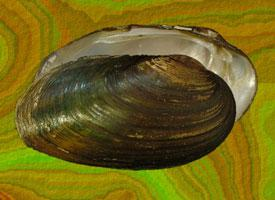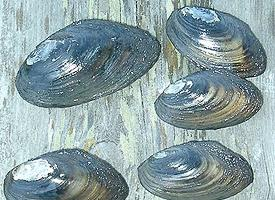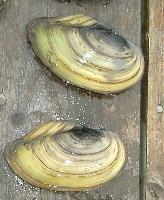
Váhy a míry
| Výška v kohoutku | od 30 do 40 mm |
|---|---|
| Délka | od 50 do 70 mm |
Stav ohrožení
| Ohrožen |
Popis zvířete
The Thick-shelled River Mussel (Unio crassus) is a fascinating and ecologically significant species that inhabits freshwater ecosystems. This bivalve mollusk, part of the Unionidae family, plays a crucial role in the aquatic environments of Europe and parts of Asia, contributing to the health and stability of its habitat through filtration and nutrient cycling.Physically, the Thick-shelled River Mussel has a robust and durable shell, as its name suggests, which can grow to a length of up to 12 centimeters (about 4.7 inches), though sizes can vary. The shell's exterior is typically dark brown to black, often exhibiting growth lines that tell the story of its age and the conditions of its environment. The interior of the shell is smoother, with a nacreous layer that can range from pearly white to a soft pink hue. The mussel's thick shell serves as a formidable defense against predators and environmental pressures, making it a resilient species in its habitat.
The biology of Unio crassus is fascinating, particularly its reproductive strategy, which involves a unique relationship with freshwater fish. To reproduce, the female mussel releases larvae, known as glochidia, into the water. These larvae must attach to the gills or fins of a specific fish host to continue their development. This parasitic stage is critical for the survival and dispersal of the species, as it allows the young mussels to travel upstream with their hosts, promoting genetic diversity and colonization of new areas. Once the glochidia mature into juvenile mussels, they detach from the host and settle into the riverbed, where they continue their development into adulthood.
The Thick-shelled River Mussel is a filter feeder, drawing in water to extract oxygen and food particles such as plankton and detritus. This feeding behavior not only sustains the mussel but also plays a significant role in maintaining water quality. By filtering out particles, these mussels help to clarify the water, reducing turbidity and contributing to the health of the aquatic ecosystem.
Despite its resilience, the Thick-shelled River Mussel faces numerous threats that have led to a decline in its populations. Habitat destruction, pollution, and water abstraction for agriculture and industry have severely impacted this species, making it vulnerable and, in some areas, endangered. Conservation efforts are crucial to protect the remaining populations and their habitats. These efforts include monitoring and protecting water quality, restoring river habitats, and researching the species' biology and ecology to inform effective conservation strategies.
In summary, the Thick-shelled River Mussel (Unio crassus) is an integral component of freshwater ecosystems, offering both ecological benefits and challenges. Its fascinating biology, including its thick shell, reproductive strategy involving fish hosts, and role as a filter feeder, underscores the complexity of aquatic ecosystems and the importance of conserving such keystone species. As it faces increasing threats from human activities, understanding and protecting the Thick-shelled River Mussel becomes ever more critical for maintaining the health and biodiversity of freshwater habitats.
Podobná zvířata
Nové fotografie zvířat
Top 10 zvířat
- Dolphin gull (Leucophaeus scoresbii)
- Japanese macaque (Macaca fuscata)
- Stone loach (Barbatula barbatula)
- Greek tortoise (Testudo graeca)
- Diana monkey (Cercopithecus diana)
- Galápagos tortoise (Geochelone nigra complex)
- Russian tortoise (Testudo horsfieldii)
- Moustached guenon (Cercopithecus cephus)
- Galápagos penguin (Spheniscus mendiculus)
- Common flying dragon (Draco volans)


